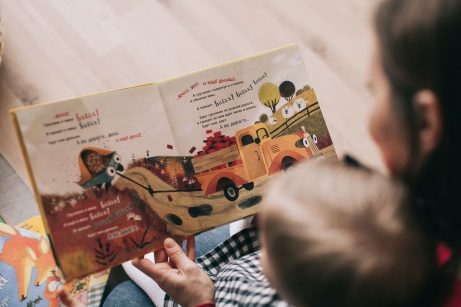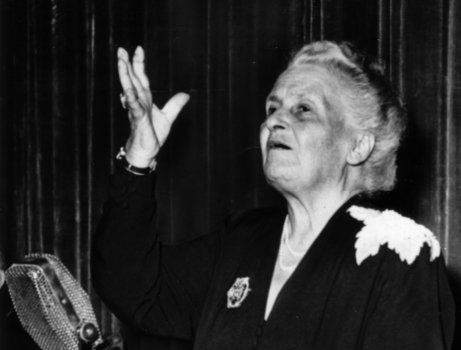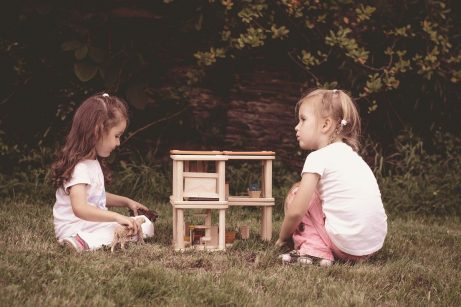The Montessori World

If you’re considering a September school start, now is the time to choose and visit schools – most work to finalize enrollment by the end of February. To assist you in understanding your options, here is a primer on the leading Montessori organizations and accreditations.
All Montessori schools are not created equal. In fact, despite the clarity of Dr. Montessori’s educational vision, her work has led to a number of diverse practices and approaches. In the best possible case, they vary due to inevitable cultural and historical diversity but are connected by a shared belief in the child’s unique potential, a holistic approach, and an observation-based examination of the child’s needs and environment. As my own Montessori trainer likes to say, there is always more than one way to do anything.
As there is however no intellectual property or copyright connected with the Montessori Method, there’s no stopping anyone from claiming that their particular flavour is the one and only “authentic” Montessori education. Sadly, as the mainstream awareness and appreciation of her method rises again, there is also a significant and growing number of schools and providers who purport to offer Montessori only in order to increase their fees, with no care or interest in even understanding what it is they claim to do.
For this reason, unless you are yourself deeply knowledgeable about your educational preferences and the workings of Montessori classrooms, as well as able and willing to research your options with lengthy observations and interviews, it might be best to rely on major international accrediting and training bodies.
The defining factors in your child’s school experience will be the quality of the teacher: combining training, experience, and the support they receive from school administration. True Montessori education can be provided very successfully on the most limited of budgets, just as it can be completely absent from schools equipped with the most expensive brand-name materials and equipment. As such, we highly encourage you to inquire first and foremost after the quality of training and education of a school’s teachers and its mission and values, next about the curriculum and workings of the school day, and lastly about material resources.

Explore the fundamentals of Montessori parenting with this free video by Sylvia Arotin, offering insights and strategies to empower and educate your child.
Association Montessori Internationale
The Amsterdam-based Association Montessori Internationale (AMI) is the oldest, and arguably most influential Montessori organization in the world. Founded in 1929 by Maria and Mario Montessori, it is dedicated to continuing Dr. Montessori’s legacy in its most authentic form.
AMI conducts research and academic activities, including book publishing through the Montessori-Pierson publishing house, and ongoing teacher education, workshops and networking. Most notable, however, are their teacher training courses and school accreditation program.
The AMI teaching diplomas are the most widely accepted and valued ones in the world; they carry with them a hefty cost and a commitment comparable to an undergraduate university degree. The AMI school accreditation, likewise, is regarded as the most stringent and difficult one to obtain. In fact, there are many wonderful schools that choose not to pursue it due to the challenges and costs, or other factors and preferences: the accreditation status is contingent on factors including precise length of school day or specific materials, and may clash with local government requirements. However, an AMI accreditation is often considered the gold standard and parents may rest assured that however you define “authentic Montessori education”, an AMI-accredited school is offering it.
American Montessori Society (not to be confused with AMI-USA)
American Montessori Society was founded in 1960 by Nancy McCormick Rambusch, signifying a beginning of a Montessori renewal in the United States. Today, it is the leading Montessori organization in North America. Although its outreach is international, the majority of its member teachers and schools are indeed in the USA.
Like AMI, AMS is dedicated to advocate and promote the cause of Montessori education. It provides research and development as well as teacher services, conducts teacher trainings and a school accreditation system.
Besides a more localized approach, AMS tends to focus more on widespread accessibility than its counterpart AMI. As such, their trainings are considered somewhat more affordable and convenient, and its school accreditation requirements are not as strict, giving member schools more flexibility. Whilst AMI carries the obligation of safeguarding Dr. Montessori’s legacy as it is (for example maintaining the physical Maria Montessori Archives), AMS has a stronger tendency to update and innovate.
Montessori Accreditation Council for Teacher Education
The Montessori Accreditation Council for Teacher Education (MACTE) is an international umbrella organization focusing on the preparation of Montessori teachers. Rather than training teachers directly, it inspects, oversees and accredits a variety of teacher training programs worldwide. As such a teacher training program seeks out the MACTE certification to assure both its students and their potential future employers of the quality of said program.
With a wide variety of worldwide programs offering wildly differing quality of education, MACTE certification should be considered an absolute necessity when considering a teacher qualification, and its absence a damning indictment of a program’s quality outside of the most economically dire situations. AMI and AMS teacher trainings, of course, far exceed MACTE requirements; fortunately, those who found themselves economically or otherwise unable to pursue an AMI or AMS training may still find a viable option through MACTE certified programs.
Likewise for parents, MACTE certified teachers offer a guarantee that a program upholds the essential Montessori principles. However, in affluent schools, parents should question why the teachers do not hold AMI or AMS diplomas instead.
Further National Programs and Organizations
With an ever-growing public interest in Montessori education, there exist a wide variety of smaller local-based national programs. Little can be said of most besides stressing the diversity in both scope and quality of services they offer. Certification or approval of small national Montessori bodies cannot, unfortunately, be taken as a guarantee of a school’s quality.
It is of course possible to provide a quality Montessori education without the assistance of these major organizations. After all, Dr. Montessori did some wonderful work without ever holding a teaching certificate of any kind! (Although she did study contemporary education and educational philosophy extensively, and the Montessori method cannot be seen as arising from a theoretical vacuum.) Reaching the necessary understanding and skillset would require, among others, discipline in self-study as well as astute observational ability with children. This very website exists to assist parents seeking a greater understanding of Montessori, and besides the resources contained herein, we also highly recommend reaching straight to the source.


